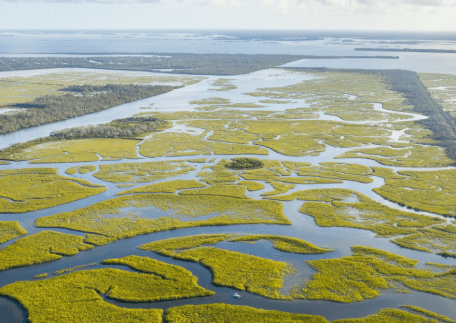Florida, known for its extraordinary beaches and vibrant cities, holds another treasure — a diverse and rich wildlife habitat. In recent years, the focus on Buying land for wildlife habitat or conservation projects has grown significantly. Nature enthusiasts, land developers, real estate investors, and Florida residents are increasingly interested in preserving the state’s unique ecosystems. Read on as we guide you through buying land for wildlife habitat or conservation projects in Florida, emphasizing the importance of these initiatives and offering practical tips for making a positive impact.
Real estate investors such as Steve Daria and Joleigh have recognized the significant impact they can make by purchasing land for wildlife habitats in Florida. By investing in conservation projects, they are helping to preserve essential ecosystems and protect native species. Their efforts contribute to environmental sustainability and inspire others to consider the ecological benefits of land ownership.
Why Wildlife Conservation Matters
Before buying land for wildlife habitat or conservation projects, it’s essential to understand that wildlife conservation is crucial for maintaining biodiversity, protecting endangered species, and ensuring the health of our planet.
Florida’s unique ecosystems, from wetlands to forests, provide vital habitats for various species.
Preserving these areas benefits wildlife and enhances the quality of life for residents and future generations.

Understanding Wildlife Habitat or Conservation Projects
Wildlife habitat or conservation projects involve acquiring and managing land to protect ecosystems and species.
These projects range from small community initiatives to large-scale efforts involving multiple stakeholders.
The goal is to create safe, sustainable environments where wildlife can thrive, and natural processes remain undisturbed.
Benefits of Buying Land for Wildlife Habitat or Conservation Projects
Discover the diverse advantages of purchasing land in Florida for wildlife habitat and conservation, from enhancing biodiversity to contributing to environmental sustainability.
Protecting Endangered Species
Florida is home to numerous endangered species, such as the Florida panther, manatee, and sea turtles, all of which depend on specific habitats for survival.
Securing land for conservation helps protect these critical habitats from development and degradation, ensuring these species have a safe environment to thrive.
By investing in conservation land, we contribute to preserving biodiversity and protecting Florida’s unique wildlife for future generations.
Enhancing Property Value
Properties near conserved lands often experience increased values due to their natural surroundings’ appeal and tranquility.
They are investing in conservation benefits wildlife by preserving their habitats and enhancing nearby properties’ desirability and market value.
This dual advantage makes conservation investment an environmentally responsible choice and a potentially profitable financial decision.
Promoting Ecotourism
Conserved lands attract nature enthusiasts and tourists, significantly boosting local economies through increased visitation and spending.
Ecotourism, which thrives in these areas, provides sustainable income sources for local businesses, from lodging to guided tours.
Additionally, this influx of nature lovers helps raise awareness about the importance of conservation, fostering a community that values and actively supports environmental preservation efforts.
Get Started: Get Your Cash Offer Below…
We are direct land buyers. There are no commissions or fees and no obligation whatsoever. Start below by sharing where your property is and where we can send your offer…
Steps to Secure Land for Conservation Projects
Explore the necessary steps for securing land dedicated to wildlife habitat and conservation efforts in Florida.
Identify Suitable Land
The first step in securing land for conservation is identifying suitable areas.
Look for properties with diverse ecosystems, endangered species, or unique natural features.
Working with local conservation organizations can help pinpoint high-priority lands.
Conduct Feasibility Studies
Before acquiring land, feasibility studies should assess its suitability for conservation.
These studies should evaluate soil quality, water sources, existing wildlife, and potential threats.
Understanding the land’s characteristics will ensure its long-term sustainability as a wildlife habitat.
Collaborate with Stakeholders
Successful conservation projects often involve collaboration with various stakeholders, including government agencies, non-profits, and local communities.
Engaging stakeholders early in the process can help secure funding, support, and expertise.
Secure Funding
Funding is a critical component of any conservation project.
Explore grants, donations, and partnerships with environmental organizations.
Additionally, consider crowdfunding campaigns to engage the public and raise awareness about your project.
Legal Considerations for Conservation Projects
Understand the essential legal requirements and regulations involved in starting and maintaining conservation projects in Florida.
Zoning and Land Use Regulations
Knowing local zoning and land use regulations is essential when securing land for conservation.
Ensure the property complies with legal requirements and restrictions that may affect its use as a wildlife habitat.

Conservation Easements
Conservation easements are legal agreements restricting land use to protect conservation values.
These agreements benefit landowners who wish to conserve their property while retaining ownership.
Environmental Impact Assessments
Environmental impact assessments (EIAs) evaluate a project’s potential environmental effects.
Conducting an EIA ensures that your conservation project aligns with ecological regulations and minimizes negative impacts.
Best Practices for Managing Conserved Land
Learn the essential strategies for effectively stewarding land dedicated to wildlife habitat and conservation efforts in Florida.
Habitat Restoration
Restoring degraded habitats is a crucial aspect of conservation projects.
Activities may include planting native vegetation, removing invasive species, and improving water quality.
Habitat restoration enhances biodiversity and ecosystem health.
Monitoring and Maintenance
Frequent monitoring and maintenance are crucial for the success of conservation projects.
Implementing wildlife surveys, habitat assessments, and maintenance activities ensures the land remains a thriving habitat for wildlife.
Community Engagement
Engaging local communities fosters support and participation in conservation efforts.
Hosting educational events, volunteer opportunities, and community workshops can raise awareness and encourage stewardship of conserved lands.
Frequently Asked Questions
Discover answers to common questions about buying land for wildlife habitat or conservation projects in Florida.
What is the primary goal of conservation projects?
The conservation project’s goals are protecting and preserving natural habitats and wildlife populations, maintaining biodiversity, supporting ecosystem services, and preventing habitat destruction.
How can you involved in conservation efforts?
You can participate in conservation efforts by volunteering with local organizations, participating in citizen science projects, and advocating for policies that support conservation.
Additionally, individuals can support conservation financially through donations or memberships.
What are the challenges of implementing conservation projects?
Implementing conservation projects can be challenging due to limited funding, land use conflicts, and environmental threats.
Collaboration, community engagement, and strategic planning are essential for overcoming these challenges.
Conclusion
Buying land for wildlife habitat or conservation projects is vital in protecting Florida’s unique ecosystems and biodiversity. Individuals and organizations can make a great impact by understanding the importance of conservation, identifying suitable land, and navigating legal considerations. Joining with the community and collaborating with stakeholders ensures the long-term success of these projects.
**NOTICE: Please note that the content presented in this post is intended solely for informational and educational purposes. It should not be construed as legal or financial advice or relied upon as a replacement for consultation with a qualified attorney or CPA. For specific guidance on legal or financial matters, readers are encouraged to seek professional assistance from an attorney, CPA, or other appropriate professional regarding the subject matter.
